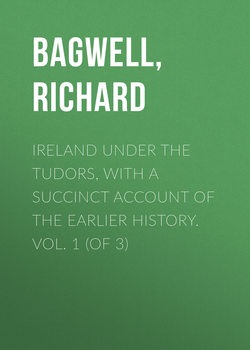Читать книгу Ireland under the Tudors, with a Succinct Account of the Earlier History. Vol. 1 (of 3) - Bagwell Richard - Страница 9
CHAPTER VIII.
THE REIGN OF HENRY VII
ОглавлениеAccession of Henry VII., 1485
Ireland was destined to give the victor of Bosworth much trouble, but his accession made little immediate difference to the Anglo-Irish community. Kildare continued to act as Chief Governor, and on the nomination of Jasper, Duke of Bedford, to the Lord Lieutenancy, he was formally appointed Deputy under him. His brother Thomas was allowed to retain the Great Seal. While thus leaving the administration of the island to the Yorkist Geraldines, Henry lost no time in restoring the rival House, which had suffered in defence of the Red Rose. Sir Thomas Butler was by Act of Parliament at once restored in blood, became seventh Earl of Ormonde, and was taken into high favour. The practical leadership of the Irish Butlers was, however, never held by him, and the disputes concerning it had no doubt great effect in consolidating Kildare’s power.
The Ormonde family. Sir Piers Butler
John, sixth Earl of Ormonde, who never lived in Ireland, appointed as his deputy his cousin, Sir Edmund Butler. Earl John dying in Palestine, his brother Thomas succeeded him, and continued Sir Edmund in the custody of the Irish estates. Sir Edmund by will granted to his son Piers the same power as he had himself held, but it does not appear that this curious bequest was acknowledged either by the Earl of Ormonde or by the people of Kilkenny and Tipperary. Sir James Ormonde, as he is called, a bastard son of the fifth Earl, became the real chief of the Butlers, and is often called Earl by Irish writers; the rules of legitimate descent being then very lightly regarded in Ireland. Sir James received a regular commission from Thomas, Earl of Ormonde, as his deputy, supervisor, ‘and general and special attorney’ in Kilkenny. Strong in the confidence of the rightful Earl and in the estimation of the people, Sir James became Kildare’s chief opponent; who to weaken him espoused the cause of Sir Piers, to whom he gave his daughter Lady Margaret in marriage. ‘By that means and policy,’ says the ‘Book of Howth,’ ‘the Earl of Wormond (i. e.
